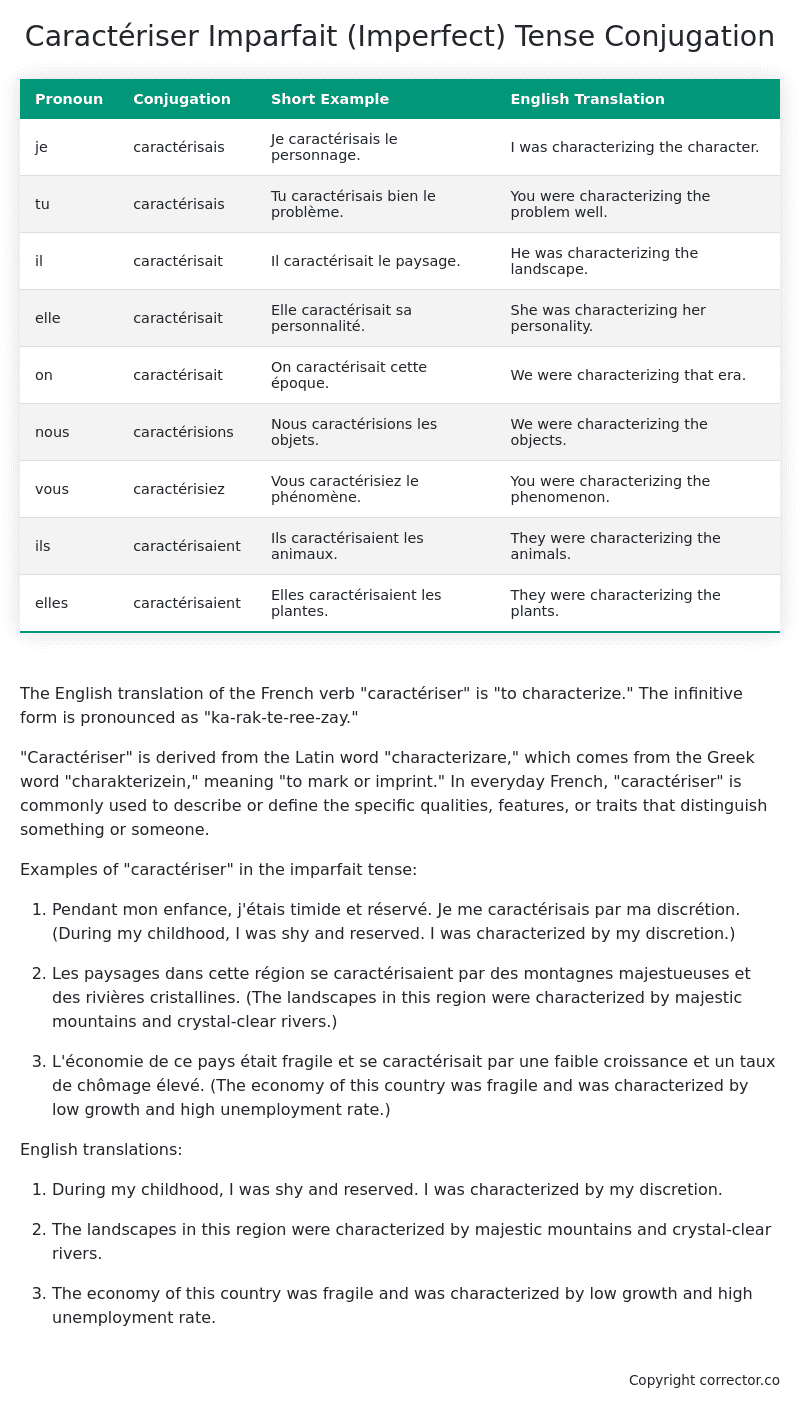Imparfait (Imperfect) Tense Conjugation of the French Verb caractériser
Introduction to the verb caractériser
The English translation of the French verb “caractériser” is “to characterize.” The infinitive form is pronounced as “ka-rak-te-ree-zay.”
“Caractériser” is derived from the Latin word “characterizare,” which comes from the Greek word “charakterizein,” meaning “to mark or imprint.” In everyday French, “caractériser” is commonly used to describe or define the specific qualities, features, or traits that distinguish something or someone.
Examples of “caractériser” in the imparfait tense:
-
Pendant mon enfance, j’étais timide et réservé. Je me caractérisais par ma discrétion.
(During my childhood, I was shy and reserved. I was characterized by my discretion.) -
Les paysages dans cette région se caractérisaient par des montagnes majestueuses et des rivières cristallines.
(The landscapes in this region were characterized by majestic mountains and crystal-clear rivers.) -
L’économie de ce pays était fragile et se caractérisait par une faible croissance et un taux de chômage élevé.
(The economy of this country was fragile and was characterized by low growth and high unemployment rate.)
English translations:
-
During my childhood, I was shy and reserved. I was characterized by my discretion.
-
The landscapes in this region were characterized by majestic mountains and crystal-clear rivers.
-
The economy of this country was fragile and was characterized by low growth and high unemployment rate.
Table of the Imparfait (Imperfect) Tense Conjugation of caractériser
| Pronoun | Conjugation | Short Example | English Translation |
|---|---|---|---|
| je | caractérisais | Je caractérisais le personnage. | I was characterizing the character. |
| tu | caractérisais | Tu caractérisais bien le problème. | You were characterizing the problem well. |
| il | caractérisait | Il caractérisait le paysage. | He was characterizing the landscape. |
| elle | caractérisait | Elle caractérisait sa personnalité. | She was characterizing her personality. |
| on | caractérisait | On caractérisait cette époque. | We were characterizing that era. |
| nous | caractérisions | Nous caractérisions les objets. | We were characterizing the objects. |
| vous | caractérisiez | Vous caractérisiez le phénomène. | You were characterizing the phenomenon. |
| ils | caractérisaient | Ils caractérisaient les animaux. | They were characterizing the animals. |
| elles | caractérisaient | Elles caractérisaient les plantes. | They were characterizing the plants. |
Other Conjugations for Caractériser.
Le Present (Present Tense) Conjugation of the French Verb caractériser
Imparfait (Imperfect) Tense Conjugation of the French Verb caractériser (You’re reading it right now!)
Passé Simple (Simple Past) Tense Conjugation of the French Verb caractériser
Passé Composé (Present Perfect) Tense Conjugation of the French Verb caractériser
Futur Simple (Simple Future) Tense Conjugation of the French Verb caractériser
Futur Proche (Near Future) Tense Conjugation of the French Verb caractériser
Plus-que-parfait (Pluperfect) Tense Conjugation of the French Verb caractériser
Passé Antérieur (Past Anterior) Tense Conjugation of the French Verb caractériser
Futur Antérieur (Future Anterior) Tense Conjugation of the French Verb caractériser
Subjonctif Présent (Subjunctive Present) Tense Conjugation of the French Verb caractériser
Subjonctif Passé (Subjunctive Past) Tense Conjugation of the French Verb caractériser
Subjonctif Imparfait (Subjunctive Imperfect) Tense Conjugation of the French Verb caractériser
Conditionnel Présent (Conditional Present) Tense Conjugation of the French Verb caractériser
Conditionnel Passé (Conditional Past) Tense Conjugation of the French Verb caractériser
Conditionnel Passé II (Conditional Past II) Tense Conjugation of the French Verb caractériser
L’impératif Présent (Imperative Present) Tense Conjugation of the French Verb caractériser
L’impératif Passé (Imperative Past) Tense Conjugation of the French Verb caractériser
L’infinitif Présent (Infinitive Present) Tense Conjugation of the French Verb caractériser
L’infinitif Passé (Infinitive Past) Tense Conjugation of the French Verb caractériser
Le Participe Présent (Present Participle) Tense Conjugation of the French Verb caractériser
Le Participe Passé (Past Participle) Tense Conjugation of the French Verb caractériser
Struggling with French verbs or the language in general? Why not use our free French Grammar Checker – no registration required!
Get a FREE Download Study Sheet of this Conjugation 🔥
Simply right click the image below, click “save image” and get your free reference for the caractériser imparfait tense conjugation!

Caractériser – About the French Imparfait Tense
NOTE: To take a deep dive into all the French tenses then see our article on Mastering French Tense Conjugation.
Formation of the Imparfait Tense
For regular -er verbs:
For regular -ir verbs
For regular -re verbs
Common Everyday Usage Patterns
Description of Past Habits
Background Information
Mental and Emotional States
It’s employed to express emotions, thoughts, or physical sensations in the past. For example: “J’étais content quand il est arrivé.” (I was happy when he arrived.)
Ongoing Actions
Points to Note About the Imparfait Tense
Passé Composé vs. Imparfait
Conditional
Si Clauses
Narration
I hope you enjoyed this article on the verb caractériser. Still in a learning mood? Check out another TOTALLY random French verb imparfait conjugation!


